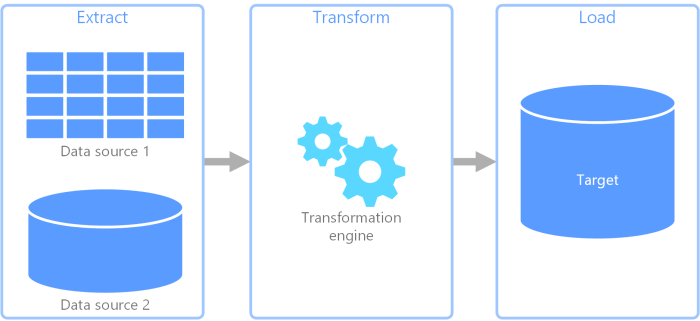ETL software solutions play a crucial role in enhancing data management processes for businesses across various industries. From simplifying data transformation to ensuring data quality, these tools are indispensable in today’s data-driven world. Let’s delve deeper into the realm of ETL software solutions and explore their key features, challenges, and best practices.
Overview of ETL Software Solutions

ETL (Extract, Transform, Load) software solutions play a crucial role in managing data efficiently for businesses of all sizes. These tools are designed to extract data from various sources, transform it into a consistent format, and load it into a target database or data warehouse.
Real-time data integration is essential for businesses looking to stay agile and competitive in today’s fast-paced digital landscape. By seamlessly combining data from various sources in real time, organizations can make quick and informed decisions. This process allows for better collaboration, improved efficiency, and more accurate insights. Discover the benefits of real-time data integration and how it can transform your business operations.
ETL software helps businesses streamline their data management processes by automating the flow of information, ensuring data quality, and providing insights for decision-making. With ETL solutions, organizations can integrate data from multiple sources, cleanse and transform it for analysis, and ultimately improve overall operational efficiency.
Organizational decision support plays a crucial role in helping companies make informed and strategic decisions. By utilizing advanced technologies and data analytics, organizations can streamline their decision-making process and achieve better outcomes. With the right tools and systems in place, businesses can gain valuable insights and stay ahead of the competition. Learn more about the importance of organizational decision support to enhance your company’s performance.
Examples of Industries Benefiting from ETL Software Solutions
- Finance: Financial institutions use ETL software to consolidate data from different systems for reporting, compliance, and risk management.
- Retail: E-commerce companies leverage ETL tools to extract customer data, analyze shopping patterns, and optimize marketing strategies.
- Healthcare: Hospitals and healthcare providers utilize ETL solutions to integrate electronic health records, streamline billing processes, and improve patient care.
- Manufacturing: Manufacturing companies use ETL software to manage supply chain data, track inventory levels, and enhance production efficiency.
Key Features of ETL Software
When it comes to ETL software solutions, there are several key features that are essential for effective data integration, transformation, and loading processes. These features play a crucial role in ensuring seamless data movement and processing within organizations.
Scalability
One of the most important features of ETL software is scalability. This refers to the software’s ability to handle large volumes of data and accommodate the growing needs of an organization. Scalability ensures that the ETL tool can effectively process increasing amounts of data without compromising performance or speed.
Data Transformation Capabilities
Another crucial feature of ETL software is its data transformation capabilities. This feature allows users to manipulate, cleanse, and enrich data as it moves from source to destination. Data transformation ensures that the data is in the right format and structure for analysis and reporting purposes.
Common Challenges in ETL Implementation

When implementing ETL software solutions, businesses often face various challenges that can impact the efficiency and effectiveness of their data integration processes. These challenges can range from technical issues to data quality concerns, making it crucial to address them effectively.
Handling Different Data Formats, ETL software solutions
One of the common challenges in ETL implementation is dealing with disparate data formats. Data may be stored in various formats such as CSV, Excel, JSON, or databases like SQL and NoSQL. ETL tools need to be capable of extracting data from different sources, transforming it into a unified format, and loading it into the target system seamlessly. This requires robust data mapping capabilities and support for a wide range of data formats to ensure smooth data integration.
Importance of Data Quality and Consistency
Ensuring data quality and consistency is another significant challenge in ETL implementation. Data coming from multiple sources may contain errors, duplicates, or inconsistencies that can impact the integrity of the entire data warehouse. ETL tools must include features for data cleansing, validation, and transformation to enhance data quality and ensure consistency across the integrated datasets. Maintaining data integrity is crucial for making informed business decisions and deriving accurate insights from the integrated data.
Best Practices for Efficient ETL Processes

Optimizing ETL workflows is crucial for ensuring data accuracy, efficiency, and reliability in the ETL process. Automation plays a key role in streamlining ETL operations, reducing manual errors, and improving overall productivity. Data validation and error handling are essential components of ETL processes to maintain data quality and integrity.
Optimizing ETL Workflows
- Break down ETL processes into smaller tasks for better manageability and troubleshooting.
- Utilize parallel processing to optimize performance and speed up data transformation.
- Implement incremental data loading to reduce processing time and resource utilization.
- Regularly monitor and tune ETL jobs for optimal performance and efficiency.
Role of Automation in ETL Processes
- Automate repetitive tasks such as data extraction, transformation, and loading to save time and reduce human error.
- Use scheduling tools to automate ETL jobs at specific intervals for timely data updates.
- Implement error handling mechanisms to automatically address issues and ensure data consistency.
- Utilize workflow orchestration tools to automate end-to-end ETL processes and dependencies.
Importance of Data Validation and Error Handling
- Validate data at each stage of the ETL process to ensure accuracy, completeness, and consistency.
- Implement data quality checks to identify and resolve discrepancies or anomalies in the data.
- Establish robust error handling procedures to capture, log, and rectify errors encountered during ETL operations.
- Utilize exception handling to manage unexpected issues and prevent data corruption or loss.
In conclusion, ETL software solutions are essential for businesses looking to optimize their data processes and ensure efficiency and accuracy. By understanding the key features, challenges, and best practices associated with ETL tools, organizations can harness the power of data to drive growth and success.
The ETL process (extract, transform, load) is a fundamental component of data integration and plays a key role in ensuring data quality and consistency. By extracting data from multiple sources, transforming it into a usable format, and loading it into a target system, organizations can create a unified view of their data. This process is essential for data warehousing, business intelligence, and analytics.
Learn more about the importance of the ETL process and how it can help your organization harness the power of data.




